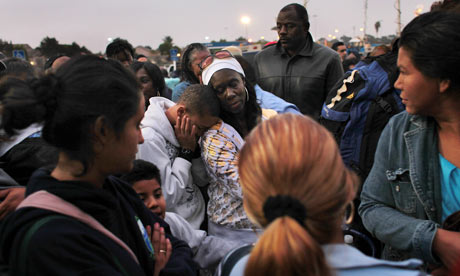Re: American States & Cities Broke- Pension math
Hmmm. I wonder if like in the Bernie Madoff case, the folks who got out early with full funding will be hit up to return their proceeds so that future or even current recipients get "something". Clawbacks. When I say "getting out early" I mean those who received fully funded pension payouts, AND those who get $50M retirement packages from Oligarch firms.
Is this any different than Bernie? No. It's merely the way the general public perceives it.
Any way you slice it, name it, call it - we're out of money and it's going to get ugly when these debts have to be settled.
Originally posted by raja
View Post
Is this any different than Bernie? No. It's merely the way the general public perceives it.
Any way you slice it, name it, call it - we're out of money and it's going to get ugly when these debts have to be settled.


 Patients without medical insurance wait for treatment in the Forum, a music arena in Inglewood, Los Angeles. The 1,500 free places were filled by 4am. Photograph: John Moore/Getty Images
Patients without medical insurance wait for treatment in the Forum, a music arena in Inglewood, Los Angeles. The 1,500 free places were filled by 4am. Photograph: John Moore/Getty Images
Comment